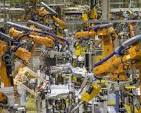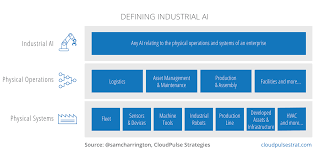The Role of AI in Manufacturing: Revolutionizing the Industry
Artificial Intelligence (AI) is rapidly transforming the manufacturing industry, bringing about significant advancements in efficiency, productivity, and innovation. By leveraging AI technologies, manufacturers are able to optimize processes, reduce costs, and improve product quality.
Enhancing Production Efficiency
AI-driven systems are capable of analyzing vast amounts of data in real-time to streamline production processes. These systems can predict equipment failures before they occur, allowing for proactive maintenance and reducing downtime. This predictive maintenance not only saves time but also extends the lifespan of machinery.
Improving Quality Control
Quality control is a critical aspect of manufacturing, and AI plays a pivotal role in enhancing it. Machine learning algorithms can detect defects with higher accuracy than human inspectors by analyzing images and sensor data. This leads to fewer defective products reaching consumers and reduces waste.
Optimizing Supply Chains
AI helps manufacturers optimize their supply chains by predicting demand more accurately and adjusting production schedules accordingly. This results in better inventory management and reduced storage costs. Additionally, AI can identify potential disruptions in the supply chain and suggest alternative solutions to mitigate risks.
Facilitating Customization
The demand for customized products is increasing, and AI allows manufacturers to meet this demand efficiently. By using AI algorithms to analyze customer preferences and trends, manufacturers can quickly adapt their production lines to create personalized products without sacrificing efficiency.
Enhancing Worker Safety
AI technologies contribute significantly to improving worker safety in manufacturing environments. Robots equipped with AI can perform dangerous tasks that would otherwise pose risks to human workers. Additionally, AI systems can monitor workplace conditions in real-time to identify potential hazards.
The Future of AI in Manufacturing
The integration of AI into manufacturing is still evolving, with ongoing research aimed at further enhancing its capabilities. As technology advances, we can expect even greater levels of automation and innovation that will continue to reshape the industry.
In conclusion, AI is revolutionizing manufacturing by improving efficiency, quality control, supply chain management, customization capabilities, and worker safety. As manufacturers continue to embrace these technologies, the industry will undoubtedly see unprecedented growth and transformation.
Exploring AI in Manufacturing: Answers to 9 Frequently Asked Questions
- How is AI used in manufacturing?
- What are the benefits of implementing AI in manufacturing processes?
- How does AI improve production efficiency in the manufacturing industry?
- What role does AI play in quality control within manufacturing?
- How can AI optimize supply chain management for manufacturers?
- In what ways does AI facilitate product customization in manufacturing?
- What safety improvements can AI bring to the manufacturing workplace?
- What are the challenges associated with integrating AI into manufacturing operations?
- How is the future of manufacturing expected to change with continued advancements in AI technology?
How is AI used in manufacturing?
AI is utilized in manufacturing to enhance various aspects of the production process, leading to increased efficiency and reduced costs. One of the primary applications is predictive maintenance, where AI algorithms analyze data from machinery sensors to predict potential failures and schedule timely maintenance, minimizing downtime. Additionally, AI improves quality control by using machine learning models to detect defects in products through image recognition and sensor data analysis. In supply chain management, AI optimizes inventory levels and predicts demand more accurately, ensuring a smoother flow of materials and products. Furthermore, AI enables greater customization by quickly adapting production lines based on consumer trends and preferences. Overall, AI technologies are integral in transforming manufacturing operations into more agile and intelligent systems.
What are the benefits of implementing AI in manufacturing processes?
Implementing AI in manufacturing processes offers a multitude of benefits that significantly enhance operational efficiency and productivity. AI enables predictive maintenance by analyzing data to foresee equipment failures, thereby minimizing downtime and extending machinery lifespan. It also improves quality control through advanced algorithms capable of detecting defects more accurately than human inspectors, reducing waste and ensuring higher product quality. Additionally, AI optimizes supply chain management by predicting demand with greater accuracy, leading to better inventory management and cost savings. The technology also facilitates customization by quickly adapting production lines to meet specific consumer preferences. Furthermore, AI enhances worker safety by taking over hazardous tasks and monitoring workplace conditions to prevent accidents. Overall, the integration of AI into manufacturing processes leads to cost reductions, improved product quality, and safer working environments.
How does AI improve production efficiency in the manufacturing industry?
AI improves production efficiency in the manufacturing industry by automating routine tasks, optimizing resource allocation, and enhancing decision-making processes. Through machine learning algorithms and real-time data analysis, AI systems can predict equipment maintenance needs before failures occur, thereby minimizing downtime and extending machinery lifespan. Additionally, AI helps in streamlining production lines by identifying bottlenecks and suggesting process improvements. By analyzing large datasets, AI can also optimize scheduling and inventory management, ensuring that resources are used effectively and waste is minimized. This leads to a more efficient production process with increased output and reduced costs.
What role does AI play in quality control within manufacturing?
AI plays a crucial role in quality control within manufacturing by significantly enhancing the accuracy and efficiency of defect detection. Machine learning algorithms are employed to analyze images and sensor data, allowing AI systems to identify defects with greater precision than human inspectors. These systems can quickly process vast amounts of data to spot anomalies and inconsistencies in products, ensuring that only high-quality items reach consumers. By reducing the likelihood of defective products, AI not only minimizes waste but also helps maintain a manufacturer’s reputation for quality. Additionally, automated quality control processes free up human workers to focus on more complex tasks, further improving overall productivity in manufacturing operations.
How can AI optimize supply chain management for manufacturers?
AI can significantly optimize supply chain management for manufacturers by enhancing demand forecasting, improving inventory management, and streamlining logistics. By analyzing historical data and current market trends, AI algorithms can predict demand with greater accuracy, allowing manufacturers to adjust their production schedules accordingly. This helps in maintaining optimal inventory levels, reducing both excess stock and stockouts. Additionally, AI can optimize logistics by identifying the most efficient routes and delivery schedules, minimizing transportation costs and improving delivery times. By providing real-time insights into every aspect of the supply chain, AI enables manufacturers to respond swiftly to disruptions and make informed decisions that enhance overall efficiency and resilience.
In what ways does AI facilitate product customization in manufacturing?
AI facilitates product customization in manufacturing by leveraging data analytics and machine learning algorithms to understand consumer preferences and market trends. By analyzing vast amounts of customer data, AI can identify specific patterns and demands, enabling manufacturers to adjust their production processes accordingly. This allows for the efficient creation of personalized products without compromising on production speed or cost-effectiveness. Additionally, AI-driven design tools can automatically generate product variations based on individual customer specifications, streamlining the customization process. As a result, manufacturers can offer a wider range of tailored products that meet specific consumer needs while maintaining high levels of efficiency and quality.
What safety improvements can AI bring to the manufacturing workplace?
AI can significantly enhance safety in the manufacturing workplace by automating hazardous tasks and reducing the risk of human error. AI-powered robots can take over dangerous operations, such as handling toxic materials or operating heavy machinery, minimizing exposure to potential hazards for human workers. Additionally, AI systems equipped with sensors and real-time data analysis can monitor the work environment to detect safety issues, such as equipment malfunctions or unsafe conditions, and alert personnel before accidents occur. AI can also assist in training simulations that prepare workers for emergency situations without exposing them to actual risks. By improving predictive maintenance, AI helps prevent equipment failures that could lead to workplace injuries. Overall, the integration of AI into manufacturing processes creates a safer environment by proactively addressing potential dangers and enhancing overall operational safety.
What are the challenges associated with integrating AI into manufacturing operations?
Integrating AI into manufacturing operations presents several challenges that companies must address to ensure successful implementation. One of the primary obstacles is the significant investment required in both technology and skilled personnel. Manufacturers need to upgrade their existing infrastructure and train employees to work with advanced AI systems, which can be costly and time-consuming. Additionally, data quality and management pose another challenge, as AI systems rely on large volumes of accurate data to function effectively. Ensuring data integrity and security is crucial, especially given the potential risks associated with cyber threats. Furthermore, integrating AI into existing processes can be complex, requiring seamless coordination between new technologies and traditional manufacturing practices. Lastly, there may be resistance to change from within the organization, as employees may fear job displacement or struggle to adapt to new ways of working. Addressing these challenges requires careful planning, investment in training, and a strategic approach to change management.
How is the future of manufacturing expected to change with continued advancements in AI technology?
The future of manufacturing is poised for a significant transformation with continued advancements in AI technology. As AI becomes more sophisticated, manufacturers can expect even greater levels of automation, leading to increased efficiency and reduced operational costs. AI-driven predictive analytics will enable more precise demand forecasting, optimizing inventory management and minimizing waste. Additionally, the integration of AI with Internet of Things (IoT) devices will enhance real-time monitoring and decision-making capabilities on the factory floor. This will result in smarter supply chains and more agile production processes that can quickly adapt to market changes. Furthermore, AI’s ability to facilitate mass customization will allow manufacturers to meet growing consumer demands for personalized products without compromising speed or quality. Overall, these advancements promise a future where manufacturing is more responsive, sustainable, and competitive on a global scale.




